- Home
- Joelle Charbonneau
Disclose
Disclose Read online
Dedication
For Nellie Bly, who defied rules and faced danger in order to report the truth.
And for all journalism students. Your passion for following the facts where they lead will change the world.
Contents
Cover
Title Page
Dedication
One
Two
Three
Four
Five
Six
Seven
Eight
Nine
Ten
Eleven
Twelve
Thirteen
Fourteen
Fifteen
Sixteen
Seventeen
Eighteen
Nineteen
Twenty
Twenty-One
Twenty-Two
Twenty-Three
Twenty-Four
Acknowledgments
About the Author
Books by Joelle Charbonneau
Back Ad
Copyright
About the Publisher
One
Some old poem claims that patience is a virtue. I know because Dewey has quoted it to me at least three times a day for the last week and a half. Each day means another without people knowing the truth. Worse, another day of not finding those who were taken—if they can still be found. Another day of planning and of realizing that despite the risks those I care about are willing to take, we still might never succeed.
How am I supposed to be patient?
“One thing at a time,” Dewey has stated so many times that I want to scream. “Patience is necessary if we want success,” he said when he handed me my new government-issued ID under a new name. “Patience and careful planning,” he advised when I cut and dyed my hair to change the way I looked.
Perhaps. But it isn’t comfortable. It doesn’t matter that I am busy training and meeting secretly with my best friend, Rose. She and her mother have agreed to take some of the biggest risks of all. We have a plan now that I hope will put people on the path to finally seeing and accepting the truth. Those meetings are why I filled out an application for Mrs. Webster’s company—one that she will make sure is accepted. They’re why I sat for a phone interview for a job she and Rose coached me through. All of it is necessary if we have any chance for success, but it all means I am sitting in a house that isn’t mine, reading the history of those who tried and failed in decades past to bring truth to those who weren’t interested in believing it, and remembering things that I wish I could forget as I count the days until finally I can try again.
Now it is nearly here, and I’m not sure I am ready for the things we will do and the choices we have agreed must be made.
Golden sunlight warms the bright azure sky as I walk down the sleek concrete sidewalk. I scan every face while attempting to appear as if I belong among the dozens of people commuting to work. After all, I’m one of them, walking to my new “job.” I roll out my aching shoulder muscles, shift the turquoise bag on my shoulder, and wince at the way the matching boots Rose gave me pinch my toes.
“Suck it up,” she told me after the package with the clothes she and her mother sent arrived at my door. I tried on the footwear while she waited for the verdict on the phone. “If you’re going to work at Gloss you have to look like you belong there.”
Apparently, fitting in at Mrs. Webster’s fashion e-zine meant wearing skintight black clothing, a lot of eye makeup, and super-uncomfortable high-heeled footwear. “What happens if the Marshals come and I have to run?” It was not just possible, but probable considering what I have done and what we are about to do.
“The Marshals are looking for Merriel Beckley. That’s who you used to be. Your government identification and the Gloss records show you are Merriam Adams,” Rose assured me. “As long as you act as different as you look, no one will question a thing.”
I used to struggle with the correct meaning of the word “irony.” Now that my eyes have been opened—now that there is zero chance of my ever returning to my high school, of resuming a normal life, of being asked to define irony again—it does not escape me that it is deeply ironic that the very thing I am fighting against—people’s willingness to accept whatever the government says as the truth—is the very reason I am able to walk down the street in plain sight.
Rose is right, I tell myself. Because words like “verify” were removed from our language, people simply believe what they are told. No one will question that I am who my new identification claims me to be. Two months ago, I would never have thought to question it myself.
Merriam Adams. I repeat the name in my head like a mantra, hoping that doing so will help me remember that’s who I am supposed to be now. “Merriam” for the book that contained the meaning of the words that changed my entire life and brought me to this point. “Adams” for a woman I read about recently. She created ammunition for soldiers who had almost no supplies left to fight.
I stop at the light at the corner of the street and shift my weight. A brown-suited gentleman with a bushy salt-and-pepper mustache smiles at me. My shoulder muscles tense. I glance down at his footwear. Just plain brown loafers. Not the military-style running boots that would have signaled for me to flee.
I let out the breath I was holding and attempt to shake off the anxiety-tying knot in my chest. If I can’t handle this walk, how am I going to deal with what I will eventually have to do? Atlas insists it won’t be necessary, but . . .
Someone bumps me. Another snaps something impatient and I look up to see the light has changed.
One step at a time, I remind myself as I make my way across the busy intersection. The glass and steel of the Chicago skyline glisten against the background of blue. Cheerful flowers of white and yellow bloom in large urns stationed along the sidewalk. Impatient car horns blare nearby, drowning out the public screens reporting news about a car that drove off Lake Shore Drive and had to be pulled out of the water. I spot the entrance of my destination in the distance, glance around for signs of anyone who might be watching me, then hitch my bag firmly onto my shoulder and approach the off-white stone and rose-gold building.
The word “Gloss” shines in gold letters above the door, but it is the small, colorful image painted on the glass of the entrance that causes me to hold my breath. For a heartbeat, the city around me drops away, and the anxiety gnawing at my stomach disappears. All I can see is the design in front of me. Black curved lines fan outward from a center point—creating the image of partially opened pages of a book or magazine. Coming from the center of the pages are licks of brilliant yellow, fluorescent pink, electric blue, and bright orange.
I trace the painted lines of the wide V created by the open book with trembling fingers. Just weeks ago, this image lived only on my tablet—created from the desperate desire to keep fighting when everyone said it was time to retreat. I only had a hint of what that fight would look like then. Only a glimpse of what I, or others, might have to do.
The inspiration behind the design was the tattoo worn by the Stewards. They were the ones who taught me the word “verify” and the truth behind what that word revealed.
I’d drawn thousands of images over the years—honed my skill in the hope that one day I could follow in my mother’s artistic footsteps. In all those years, nothing I had created was as personal as this image. Nothing had mattered as much as the moment when I sent it to Rose and waited for her to show it to her mother, hoping she would agree it was right for Gloss.
That was weeks ago, and now here it was—paint swirled onto the glass—the new logo for the top fashion and entertainment e-zine.
And a target Mrs. Webster has knowingly placed on her back.
“The Marshals will recognize the
inspiration for the logo,” Atlas warned on the day I explained my new plan to Rose and her mother. It took some doing to safely meet face-to-face. The Marshals’ search for me included watching Rose and her mother. If it weren’t for the network of buildings with alternate exits that Dewey and Atlas had unearthed from their work with the Stewards, we would never have managed it.
I paced the length of the room, unable to sit in the worn, mismatched orange and red armchairs the Stewards had placed in the room—as I waited for them to arrive. I worried the Marshals would stop them from coming. I was terrified to meet with Mrs. Webster after my part in her son’s disappearance. If I hadn’t stolen Isaac’s identification to verify the information I’d been given by the Stewards, Isaac would have never been taken by the Marshals. He would be safe instead of imprisoned—or worse. City officials had told Rose and Mrs. Webster that he was still alive—kidnapped by a fictitious criminal gang. It was a lie. And despite all of that, I needed to ask not just for forgiveness but also for their help.
Mrs. Webster should have screamed or slapped me. I wouldn’t have blamed her. The angry click of her needle-thin, gold-and-black-swirled heels as she crossed the gray tile floor toward me made me brace for both. Instead, she pulled me against her in a fierce hug and when she finally let go and removed her gold-framed sunglasses there were tears glistening in her deep brown, perfectly made-up eyes.
As Rose stepped next to her mother’s side, I hurried to say, “I’m sorry.”
Mrs. Webster held up her hand. “Stop right there. Rose and I have talked. I know the truth about what happened to my son.”
Not the story the police and the mayor gave her about Isaac being kidnapped by a dangerous gang actively working to undermine the city’s security and disrupt everyone’s lives, but the real truth, where Isaac was taken by the Marshals because the security card he was given for his summer job was used to enter a room that held government secrets. The security card I “borrowed” without Isaac’s knowledge.
“Isaac’s gone because of me.” I force myself to look into her eyes.
“You didn’t take my son. You didn’t lie to me about why he is gone,” she snapped.
“My father did that.” Rose stepped beside her mother. “My lying-for-the-government-means-more-to-me-than-my-children father.”
“And now—” Mrs. Webster straightened her shoulders. “I’m going to do whatever I have to in order to get my son back.”
Which is why we have a real plan—a plan that if everything goes right has a real chance of working—and why my design is now on the Gloss door.
“It looks amazing, right?”
I jump at the voice behind me and turn to see Rose standing on the sidewalk, her thick, dark hair framing a face that, despite the stress and lack of sleep, is still beautiful. She smiles from mere feet away—where she is not supposed to be—and I stand still as a stone trying to decide how to remind her that Merriam Adams and Rose Webster aren’t supposed to know each other.
“As of this past Monday that’s the new logo for Gloss. We’re refreshing our whole image,” Rose says to fill the silence between us, then holds out her hand. “Sorry, I’m Rose Webster. I’m a summer intern. I was told another intern was starting today. That’s you, right?” When I still say nothing her smile falters. “Or did I just make a total idiot of myself?”
“No. You surprised me.” I smile now that I finally understand what Rose is doing. “I’m Merriam—new design intern.”
Rose grins. “I think we are going to be great friends, Merriam. To prove it, I’m going to show you around. Ready to take the fashion world by storm?” she asks, her eyes serious as she opens the door to the Gloss offices.
Am I ready?
Two weeks ago, I refused to leave the city. I was determined to stay and continue the mission my mother started before the government had her killed. I wanted to help restore censored words to the country—to find Rose’s brother, Isaac, and all the others the government had caused to disappear. And this was a key piece of the puzzle—using Gloss to bring truth to a country that thinks it already knows what the truth is.
It is the first step. One I’ve been impatient to take, and yet, I hesitate as I look at the open door.
The last time I helped create a plan, it failed.
I failed.
For months, I dreamed of my mother’s death. Her wrapped in her red coat standing on the beige-gray concrete sidewalk. The bright gold headlights of the car shining against the dark of the night. The scream that must have cut through the unseasonable cold. In the last week, new faces have joined that dream. Several members of the Stewards appear in my restless moments of sleep. I see Flap’s pink hair framing a lifeless face as she is dragged along the stone-paved concourse of Navy Pier. I can almost feel each bullet strike Stack’s chest before she falls to the ground—her eyes turning blank and cold. The other four are less clear. I have been told their names, but I can’t pick out their faces. It all happened in the hours before we set off for the mission I convinced everyone would spark a revolution. And so, their memories haunt mine.
I was told the time wasn’t right, yet. By those who were older than me, who had known the truth about what the government had done. They said we should wait.
Perhaps they were right. Perhaps I should have gone with my father, who was secreted out of town by the Stewards to I’m not sure where with nothing from our old lives to bring with him. Our house was packed into a moving van. My school and dad’s work were told that he took a new job in Washington state. From what I can tell, not one person doubted the information they received.
My father was offered a tablet to bring with him. It was loaded with a picture of my mother and me. It could be used to send messages the government wouldn’t track. He left it behind. Unlike Rose’s mother, Dad blamed me for ruining his life. Rose told me it was just the alcohol talking. I couldn’t find the words to tell her it was his way of choosing the alcohol instead of me.
I adjust the backpack that holds the tablet Dad refused. Rose’s dark brown wide-set eyes are filled with a determination that matches mine. Rose and her mother are willing to risk everything to get Isaac back. I have to do the same.
“I’m as ready as I’m ever going to be.”
“Good, because with the new campaign there’s a lot of work to do,” Rose says as she escorts me through the doors toward a mosaic-tiled counter comprised of various shades of pink, cream, and blue glass. The name Gloss is written in gold and silver in the center of the turquoise wall behind it. The other reception walls are filled with cleverly positioned screens displaying past Gloss covers. Silver chairs are clustered in the corner of the perfectly polished white floor. A runner of the exact blue as the walls is unfurled in front of the counter—like a small patch of water in the middle of an otherwise frozen pond.
Anna, the receptionist, turns toward us. Her eyes narrow behind her purple rhinestone-encrusted glasses. The last time she saw me was several months ago. My hair was long and dishwater blond then. Nothing like the short red-and-white-streaked style Rose created for me. Still, I hold my breath as I hand over identification with my new name and picture so I can be signed in.
After studying me for several long seconds, she says, “You’re early, but someone should be in the design department if you want to go back now.”
When I assure her that I do, she adds, “Your eyeliner is wonderful. Blue is definitely your color.”
She issues me a temporary pass, tells me to come back after lunch to exchange it for a permanent one, and loses interest in us as the phone behind the counter begins to ring.
Once we pass through the door that leads into the main section of offices, Rose quietly says, “I understand that I’m not supposed to know you, but Mom needs the new images you worked on last night. She’s shuffled some of our advertising space around and instead of tomorrow, she is going to launch the new campaign this afternoon.”
“But that wasn’t the plan.” My stomach lurches. �
�Atlas hasn’t returned, yet. We don’t know what he’s learned or whether he’s convinced anyone else to help.”
If we have any hope for success, we will need more Stewards willing to take a risk.
Rose frowns. “I thought you said he’d be back yesterday.”
The worry I’ve been trying to hold at bay storms through me.
“He just . . . got delayed,” I say, hoping that it’s the truth.
Atlas broke the rules to invite me into the Stewards. He introduced me to “verify,” and the other words the government removed from the electronic versions of our books. Words no one remembered. Words that made it easy for everyone to forget.
Atlas knew my mother. He hoped that I might know something that could help him find his father, and the other people who were suddenly killed or disappeared because they understood what those missing words meant for our country. He gave me paper books to read. He helped me question everything I had been told, including what the police said about my mother’s death.
He was there for me as I came to terms with her murder. It wasn’t pretty, but he supported me. And in doing so, he claimed a piece of my heart.
For the last week, while I’ve been working to get ready for today, Atlas has been zigzagging around the city trying to uncover Unity Centers where the government holds those that disappeared. He’s also been looking for Stewards who stayed aboveground and might be interested in continuing to fight for the truth. His success is important, but so is his return.
“Have you heard from him at all?”
I shake my head. He was supposed to leave a coded message if he needed more time so we wouldn’t worry that he had been captured by the Marshals.
“He’ll be fine,” I say, irrationally hoping that saying the words aloud will make them true.
“He’ll be more than fine when he sees the logo appear on public screens,” Rose insists.
“I hope so,” I say, but what I really mean is that I hope Rose and her mother will be fine. Even if I wanted to put a stop to our plan, now that everyone inside Gloss has seen the logo, Rose and her mother are in danger. Eventually the Marshals will hear about the design that has too many similarities to the Stewards’ tattoo to be ignored. The only way Gloss will be allowed to continue—the only way Rose and her mother will be safe from disappearing like Isaac—is for us to follow the plan and display the logo in full sight of the general public as soon as possible. Once everyone has seen it, it will be harder for the government to shut Gloss down over it. Not without lots of unwanted questions. About why the symbol is so terrible. About what the symbol means.

 Forbidden Fruit
Forbidden Fruit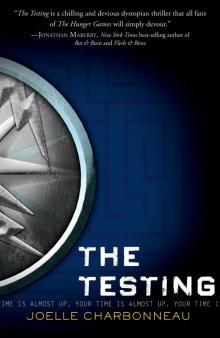 The Testing
The Testing Need
Need Eden Conquered
Eden Conquered Murder for Choir
Murder for Choir Into the Garden
Into the Garden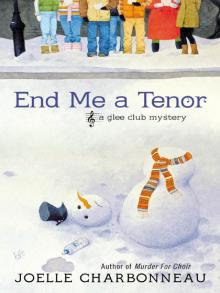 End Me a Tenor
End Me a Tenor Skating Around the Law
Skating Around the Law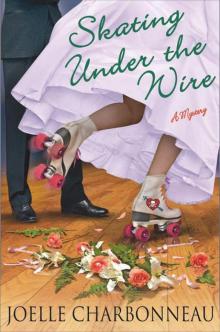 Skating Under the Wire
Skating Under the Wire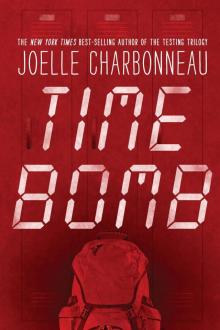 Time Bomb
Time Bomb Skating Over the Line
Skating Over the Line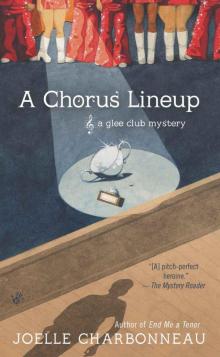 A Chorus Line-Up
A Chorus Line-Up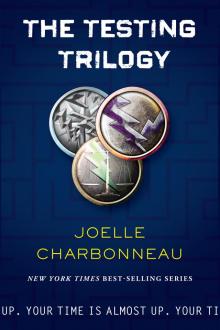 The Testing Trilogy
The Testing Trilogy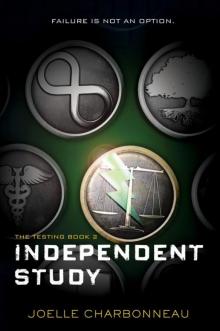 Independent Study
Independent Study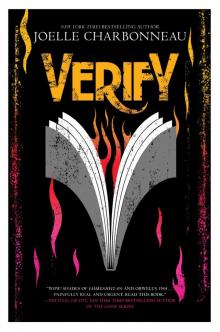 Verify
Verify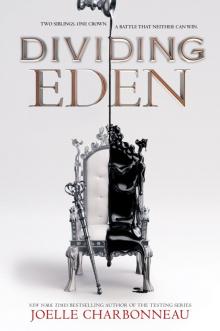 Dividing Eden
Dividing Eden Graduation Day
Graduation Day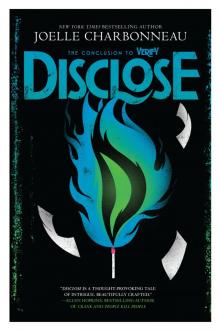 Disclose
Disclose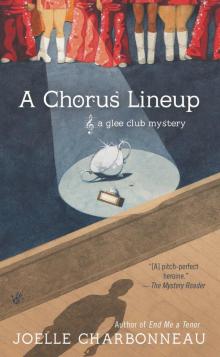 A Chorus Lineup
A Chorus Lineup